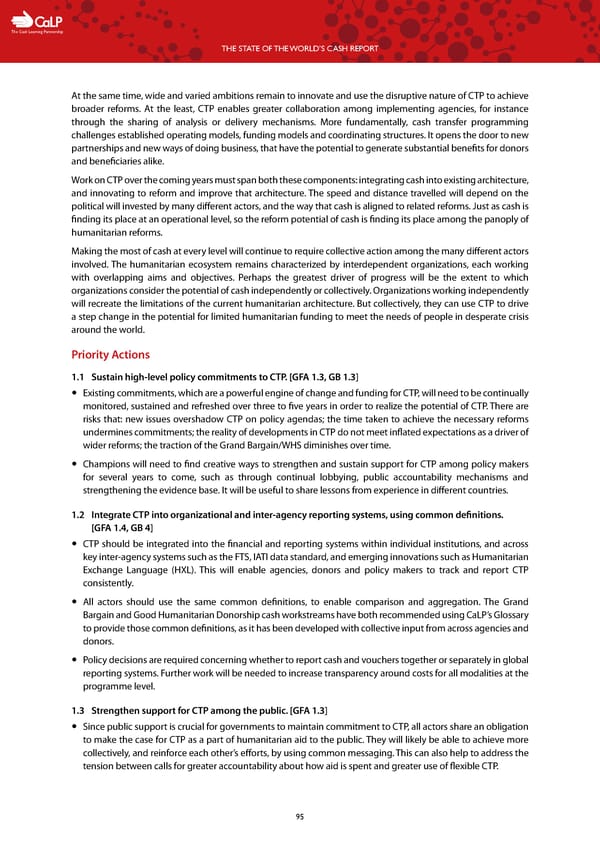C The Cash Learning Partnership THE STATE OF THE WORLD’S CASH REPORT At the same time, wide and varied ambitions remain to innovate and use the disruptive nature of CTP to achieve broader reforms. At the least, CTP enables greater collaboration among implementing agencies, for instance through the sharing of analysis or delivery mechanisms. More fundamentally, cash transfer programming challenges established operating models, funding models and coordinating structures. It opens the door to new partnerships and new ways of doing business, that have the potential to generate substantial benefits for donors and beneficiaries alike. Work on CTP over the coming years must span both these components: integrating cash into existing architecture, and innovating to reform and improve that architecture. The speed and distance travelled will depend on the political will invested by many different actors, and the way that cash is aligned to related reforms. Just as cash is finding its place at an operational level, so the reform potential of cash is finding its place among the panoply of humanitarian reforms. Making the most of cash at every level will continue to require collective action among the many different actors involved. The humanitarian ecosystem remains characterized by interdependent organizations, each working with overlapping aims and objectives. Perhaps the greatest driver of progress will be the extent to which organizations consider the potential of cash independently or collectively. Organizations working independently will recreate the limitations of the current humanitarian architecture. But collectively, they can use CTP to drive a step change in the potential for limited humanitarian funding to meet the needs of people in desperate crisis around the world. Priority Actions 1.1 Sustain high-level policy commitments to CTP. [GFA 1.3, GB 1.3] — Existing commitments, which are a powerful engine of change and funding for CTP, will need to be continually monitored, sustained and refreshed over three to five years in order to realize the potential of CTP. There are risks that: new issues overshadow CTP on policy agendas; the time taken to achieve the necessary reforms undermines commitments; the reality of developments in CTP do not meet inflated expectations as a driver of wider reforms; the traction of the Grand Bargain/WHS diminishes over time. — Champions will need to find creative ways to strengthen and sustain support for CTP among policy makers for several years to come, such as through continual lobbying, public accountability mechanisms and strengthening the evidence base. It will be useful to share lessons from experience in different countries. 1.2 I ntegrate CTP into organizational and inter-agency reporting systems, using common definitions. [GFA 1.4, GB 4] — CTP should be integrated into the financial and reporting systems within individual institutions, and across key inter-agency systems such as the FTS, IATI data standard, and emerging innovations such as Humanitarian Exchange Language (HXL). This will enable agencies, donors and policy makers to track and report CTP consistently. — All actors should use the same common definitions, to enable comparison and aggregation. The Grand Bargain and Good Humanitarian Donorship cash workstreams have both recommended using CaLP’s Glossary to provide those common definitions, as it has been developed with collective input from across agencies and donors. — Policy decisions are required concerning whether to report cash and vouchers together or separately in global reporting systems. Further work will be needed to increase transparency around costs for all modalities at the programme level. 1.3 Strengthen support for CTP among the public. [GFA 1.3] — Since public support is crucial for governments to maintain commitment to CTP, all actors share an obligation to make the case for CTP as a part of humanitarian aid to the public. They will likely be able to achieve more collectively, and reinforce each other’s efforts, by using common messaging. This can also help to address the tension between calls for greater accountability about how aid is spent and greater use of flexible CTP. 95
 The State of the World's Cash | Full Report Page 96 Page 98
The State of the World's Cash | Full Report Page 96 Page 98